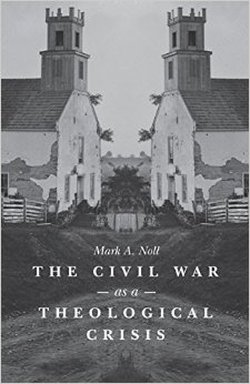
Mark A. Noll
The University of North Carolina Press, 2015 Paperback, 216 pp., $22.95
ISBN: 978-1-4696-2181-4
Image courtesy of amazon.com
There are great number of lectures and dissertations, but none of them have ever been handled like this before. In The Civil War as a Theological Crisis, Mark Noll uses sermons, articles and memoirs to argue the theological parameters of the causes of the Civil War. This is not a one volume treatment of religion on the effect of the war, but looking into how the theological battles on the subject of slavery was handled in the early stages of the conflict and even throughout the war. The end product is one of the most thought provoking studies done on religion and the effects it can have on the minds of the people and ways in which the words of the preachers can influence a nation.
Mark A. Noll is one of the country’s leading Christian historians and specializes in Christianity in both the United States and Canada. He is the Francis A. McAnaney Professor of History at Notre Dame University. His other works include America’s God: Jonathan Edwards to Abraham Lincoln, Protestantism – A Very Short Introduction, and Religion and American Politics: From the Colonial Period to the Present. Noll is a member of the American Academy of Arts and Sciences and is the 2006 recipient of the National Endowment for the Humanities medal at a White House Ceremony.
Unlike other works written about religion during the Civil War, this book turns the attention to the theological explanations which were given during the conflict. The great questions posed in this book are the one which were placed during the events and shows both sides of the question as they were proposed then. This book also explains the strong stance which theologians took during the Antebellum period especially on the subject of Slavery, and not just slavery but African Americans as well. Most of the beginning of the book deals with both Protestant and some Jewish theologians since they were the most prominent at the time, but Noll also deals with the Catholic peoples at this time as well. This study, which reaches all around the different religions of America during this time, shows the many schools of thought fueling the arguments which not only brought about war but created legislation as well. The many different theologians mentioned in this book may be familiar to some, especially Henry Beecher, but there is definitely something to be learned in this volume by anyone remotely familiar with religion in the war. Some of the points made in this book are even groundbreaking in their very nature.
I highly recommend this book to anyone interested in religion during the Civil War along with anyone interested in the war as a whole. The narrative and exhaustive research are well done and is easily accessible to anyone. Even beginner students of the war will find something of value in this book. In conclusion, no study of religion in the Civil War should go without a reference to this book and should be hailed as one of the most prominent civilians studies of the war along with religious studies of the war.
 RSS Feed
RSS Feed
